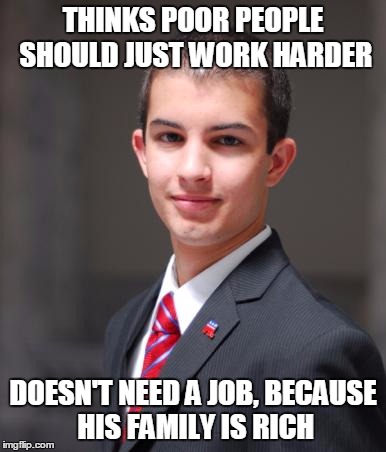Just as this PowerPoint about Marxism says, a superstructure is a system where one social class controls all the other classes through law, education, media, religion, etc.
I believe that the upper class, which definitely includes those in political power, make up this superstructure. They basically run the United States and make the decisions about what should be done in our country. Lower class people have no say in matters like law, education, and media. They don't have the money to make a difference. But should money and higher SES be the determining factor?
Above is a link to a website about class struggle. It is defined as a struggle over the surplus wealth created by the producing classes.
In American history, it was the Europeans who introduced the U.S. to classes. They brought over feudalism, merchant capitalism, and even slavery. Having higher and lower classes and especially indentured servitude and slavery has brought about a lot of violence.
One of the first examples was in 1676, when there was Bacon's Rebellion in Virginia, and slaves, indentured servants, and frontiersmen fought against the state government.
Other small rebellions and fights led eventually to the Civil War, probably the greatest example of class struggle our country has had. Thankfully, slaves were freed and African Americans were given rights, in which they could try to improve their situation to rise to a higher class. Unfortunately, after slavery ended, class struggle lines became even more clear as the working class grew, as well as the upper class. The middle class became smaller and smaller as more people were trying to receive jobs and move up in society.
Now, the United States still has a problem with where the wealth should be distributed, and we are still seeing people in the lower/working class who are trying to be heard but struggle to find a voice. In 2011, however, the Occupy Wall Street movement showed thousands of Americans unhappy with our government and financial situation.
We've seen other protests in the past few years, as well, with fast food, retail, and service industries who feel they have been treated unfairly and have walked out or gone on strike.
From The Washington Post, I found some typical stereotypes that people have with the Lower Class.
1. They do not value education
Too often this is linked to parents being involved in the school with activities going on, but just because poor parents cannot visit and participate does not mean they don't value their children's education.
2. They are lazy
This is simply not always true, because many lower class families are working full-time jobs and even work several jobs to provide for their children. It can be hard, too, for poor parents to find better jobs that give better benefits and more income. More than 1 out of 5 jobs in the U.S. pay at a rate that is below the poverty threshold. This is a problem.
3. They are substance abusers
But actually, low-income workers are actually less likely than wealthier people to abuse or use alcohol. It is true that we see a lot of people in poverty drink, but this is mainly associated youth, not associated exactly with the lower class.
4. They are linguistically deficient and poor communicators
It is true that many children from poor families come into school with not learning as many words as wealthier students. They also usually have lower reading levels at the beginning of school. But this does not mean that their language use is deficient or that it reflects on the parents as not valuing education.
5. They are ineffective and inattentive parents
Most actually care a lot about their children and are very attentive to their needs. Single moms especially are known for encouraging their children to pursue higher education.
Understanding that there is lower class individuals out there, I know that I am bound to have many students throughout my career as a teacher who are poor and come from lower class families. They may not have all the resources they need at home to feel successful in school, and so I want to get to know my students and provide what I can in the classroom to have their needs met, at least in school. With some cases, I may be lenient and more understanding, depending on situations that parents are in to help their children. I want to create a safe place where they do not have to be stressed about what their family worries about in the home, so they can relax and feel confident in doing their best and being happy.
The article in our reading assignment "Invisible Inequality: Social Class and Childrearing in Black Families and White Families" talked about a study done comparing difference between middle class and working class/poor families. In the article, the working class was more passive towards schools and professional institutions. They usually didn't feel like they could express their opinions to teachers and usually didn't trust them. I think this was because they must have felt institutionalized oppression in the past. They are used to the higher classes getting their way and receiving what they need, and they feel useless and hopeless.
I want to avoid this kind of oppression for my students who are in the lower class. I want to try my best to be a trustworthy and approachable individual that students and parents can come to for solutions or for help. I want to work out ways to improve the education of students who may have trouble reading at the beginning of the school year and want to reach out to parents to show my concern and love for their children.

